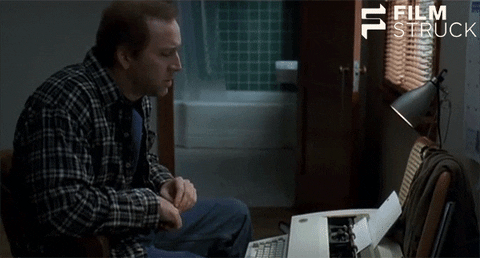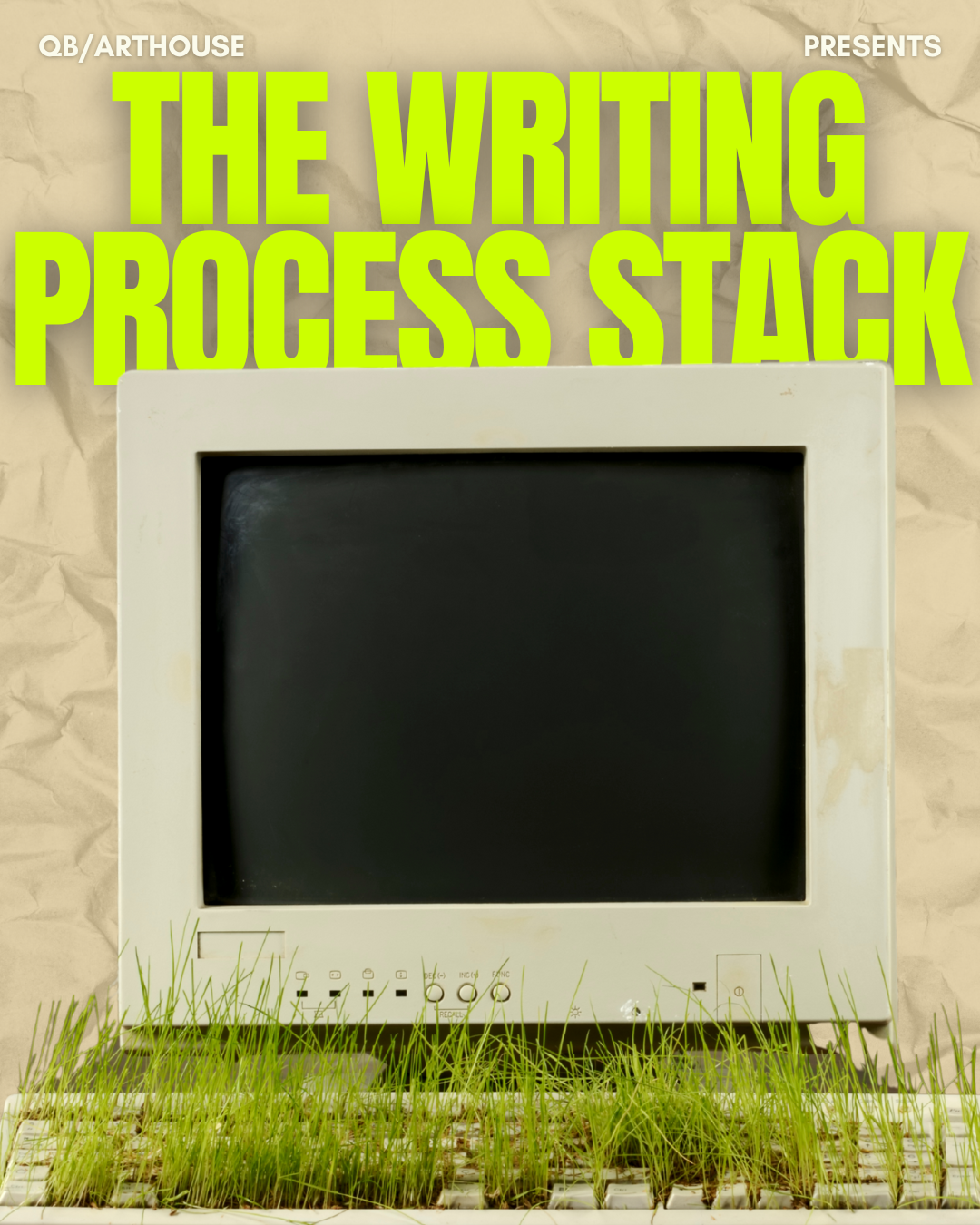riddle me this…
What’s the only difference between someone who can spin captivating, life-rattling turns of phrase with the confidence of a base jumper,
and someone who is in a co-dependent relationship with the blinking cursor on their blank page?
If you guessed it’s the multi-year Masters Degrees from as many institutions as will fit on their resume, that’s not it.
Or, if you think it’s hiring a $10,000 lightning-in-a-bottle style Mentor-Editor hybrid, nah, not that either.
Or, if you guessed they have an open calendar, no responsibilities, and the free time to let their mind luxuriate in the thinking process until the Muse enters the chat and gives them something Very Important To Write, sorry to say, but no.
Because while all of these strategies are objectively helpful for folks with time and money to spare, they don’t address the real-time elephant in the room for independent artists: how to write with attention-grabbing confidence now.
Because for independent artists, powerful writing is the key that unlocks many career doors.
And if they don’t make it a point to write that like on purpose, they’ll spend their entire lives waiting for someone to hand them the mic, wondering what they could have made if only they had just pushed themselves past that stupid but terrifying blinking cursor and done it themselves.
You’re sitting there, staring into the depths of the abyss, also known as a freshly opened Word doc titled: Untitled.
And that’s when it rushes over you — existential dread cosplaying as logic walks into the frame of your mind and whispers, You have nothing to say.
You want to answer back and say, Nuh uh I do! But instead, you’re faced with the Cursor of Truth. Blinking at you from the beginning of a perfectly untouched document that will probably end up in the digital landfill smelling up your GDrive.
Another good idea lost to the pressure of writing it down. Another day of listening to that voice telling you you have nothing new to say. Your heart sinks as you open up Substack and see someone else is already riffing on the ideas you couldn’t even get out of your Drafts folder.
You close up your computer, pick up your phone, and scroll, because at least that doesn’t feel like this.
As a creative person who has the instinct to put pen to paper, you should never find yourself stuck behind the unlived life of your Drafts. You don’t need to be Joan Didion, or Octavia Butler, or Sally Rooney, or Gabrielle Zevin. In fact, the whole point of writing is to sound like you, not anyone else. What you actually need is the kind of confidence that could overpower the antagonizing blank page like Stone Cold dominating Vince McMahon in their 1999 steel cage match.
You know… relentless.
You want your instincts to flow from your brain to the page without getting caught in the mental booby trap of writing the “right” way. You don’t want your creative impulses to overwhelm you, you want them to catapult you. You want to let your ideas rip like a kid on a water slide in August.
And not only this, you want your writing to do something.
You should feel confident in your ability to write something singular — something that gets produced, books the client, clinches the meeting, sells the pitch. When you sit down to write, you should feel your fingertips casting a spell, knowing you will always find the words to alchemize your hopes into real world outcomes.
Writing should feel fun like you’re on the best first date of your life.
It should feel meaningful, because the work you do on the page is not insignificant.
When you commit to writing (both practicing and publishing it), the process changes you from the inside out, making you a stronger artist and more connected human.
If you want to write with confidence, there are 5 things you gotta understand…
“Writing isn’t easy for me, so I’m not really a writer.”
You and Hemingway, baby. He said, “Writing is easy, you just sit down at a typewriter and bleed.” So YES! Writing is objectively not easy! It’s cumbersome, it demands mental fortitude, and psychological sweat. It requires you to wrestle with all sorts of thing from truth to syntax to rhythm. It’s a muscular project.
Of course, you could train some GPT to do it for you, but let’s cut the pretense here. We know it when we read it. People don’t read & get hooked on your work because it was easy to write. They read & get hooked on it because they can feel you working through it.
One thing you learn after writing for a loooooong time is the more difficult something is to write, and the more you endure to find your way through it, the more satisfying and enlightening it is for your reader. So how do you endure? You use simple frameworks. Frameworks are the marble walls keeping you inside the arena. You can push up against them, lean against them, throw rocks at them, take a rest against them. Frameworks give you something to work against or push off from, but their main task is to keep you in the arena so you have no choice but to endure.
For real writers, writing isn’t easy. Frameworks help them stick to the process.
“It’s embarrassing to call myself a writer when no one is publishing me.”
It is so understandable to equate being a good writer with being a published writer. As writers, we spend so much time daydreaming, fully disconnected from the here and now. We’re connecting the thing we just learned about indigenous plant roots with the current headline about an intercontinental railway system and we thought those two ideas might work in our Substack essay about the politics of perimenopause. It’s wild how much time we spend in our heads.
And a publisher — someone paying us with dollars or exposure or both — is the connective chain pulling us back to earth, reminding us that we’re really here and really doing this. Getting published can make us feel real.
But does that make you a writer?
I think we can agree that Emily Dickinson, who only had 1-2 poems published in her whole lifetime and whose backlog of 1800 unpublished poems was only found after her death while her sister was digging around, was 100% a writer. Writing isn’t just for people with a long list of bylines. Writing is a tool of the people.
You’re a writer because you write.
“I honestly don’t even know where to start.”
We’ve all stared at a blinking cursor before, absolutely down-to-the-bone certain we’ll never have another good idea for as long as we live. Whether it’s a social media caption or the start of your memoir, beginning something requires equal parts courage and delusion.
But think about how you get into conversation with someone new. It can feel challenging, and sometimes anxiety-producing, because you think oh god what am I gonna say?! But then one thing changes and the whole conversation comes pouring out of you. They’re laughing. You’re riffing. It’s actually pleasant. What changed?
Someone asked you a question.
Sometimes all we need is a prompt. One little question to give us one little nudge. A prompt is a door someone opens for you, so you can walk through it with your history, your emotions, your opinions, and your own questions. Prompts are a writer’s failsafe.
When you put the pressure on the prompt instead of how you answer it, you’ll be entering a room full of your brilliant ideas.
“I’m scared to try writing in a new format.”
Like me, you probably reallllllly like being good at what you do. Look, it feels good to do things quickly and easily and without too many expletives shooting through your inner narrative! And so when you think about transitioning from writing on Substack to copywriting, or from writing your social media captions to outlining a book proposal, or from writing pure non-fiction to putting on your Sally Rooney-pants, that can feel scary! You are, objectively, heading into the unknown.
But here’s the cool thing: writing at any level, in any format requires the same exact fundamentals. The underlying principles of good writing don’t change just because the format does.
Once you’ve got the principles down, your voice will come through any kind of writing you try.
“writing isn’t a great way to make money, and, uhm. I need money.”
It’s been a difficult century so far, has it not? Wages are down and that includes what’s possible in a book deal, for a commissioned piece of writing, and even “steady writing jobs” have turned employees into contractors, making all work gig work. Counterintuitively, that means now is the best time to boost your writing confidence.
Because as jobs get scarcer, and AI gets more lucid, and people look for more shortcuts, engaging in the muscular project of writing makes you singular. It becomes your calling card. It automatically builds trust with your audience. It becomes a tool you can use whenever you need to break through the noise. Knowing how to write means knowing how to connect.
Want to land a huge grant? Submit for a job that isn’t even available yet? Sell your merch? Make your film submission stand out? Email your hero for coffee? Get permission to use a piece of music in your web series without paying royalties? Then you’re going to have to write!
You may not make money from writing the way you used to make money from writing. But yeesh, no one is making money the way we used to do anything.
If you have a writing process, you can navigate your way through tricky times like this with more ease and more confidence because you’ll make more of your own opportunities.
Instead of fighting with the Blinking Cursor, let your writing voice rip.
When you stop putting everyone with a Substack of 100+ followers on a pedestal and embrace the singular, artistic, exciting voice you’ve always had, you’ll finally:
trust that you can always find your way into and out of a blank page.
feel comfortable, and even DELIGHT, in the writing process — which in turn, will help you write more.
revisit that scary first draft you haven’t wanted to look at for the past 6 months.
feel confident enough to take bigger career swings.
feel inspired by life’s many prompts, from the mundane to the mountainous.
see your various writing projects start to have some prestige in the world.
start growing an audience and generating a scene of like-minded creatives who all want to hang out around you and your work.
have full clarity on which writing projects are important to you and where you should be focusing next.
create the ultimate 21st century insurance package to keep you afloat when industry bubbles once again burst: a backlog of original IP.
see new professional doors open you didn’t even know were there.
have fun marketing your work to the world because you believe in it (whoa!).
plus so many other synchronistic and surprising things because, Life, she do be like that.
I’ve spent 2 decades writing professionally, and I found that most independent artists have a misguided notion that The Correct Writing Process™ is some fancy, accredited cheat code only special people get to learn. They assume writing is hard and their writing voice is weak.
And truth be told, this mythology tends to stick because without a process, it can feel like you’re George Clooney in a spacesuit, letting go of Sandra Bullock, drifting out into deep space forever after.
That’s why I put together a set of frameworks, prompts, and tools to bring you back to earth (the blank page) and let out a powerful voice to makes things happen.
What people are saying
-
I received so much clarity from this Courtney. Thank you!!!
Linda
-
Courtney's sharp mind and fierce creativity and devotion to art combined mean she's able to put into words what every indie artist is thinking and feeling, and break it down into incredibly useful, unconventional and highly enjoyable frameworks. Can't recommend it enough!!
Bruni
-
Your class gave me so much encouragement because it put the soul back into the marketing landscape of writing. I often just would rather expend my energy writing a song than writing a newsletter but now I’m seeing how they don’t have to be separate but rather the newsletter is a continuation of the songwriting headspace and they can feed each other.
Mary
-
i really loved your structure it was inspiring and gave me many new ideas! ❤️
Eniko
the writing process stack
INTRODUCING…
A set of practices to take writers from banging their head against the blank page to feeling like Nora Ephron in her blockbuster era.
Here’s what’s included
*
Here’s what’s included *
you’ll learn foundational principles that help you get attention from your writing
-
A one-hour video course plus downloadable slides where we’ll cover:
How to use emotional accuracy to make people guzzle your writing like a freshman doing a keg stand.
The one trick to stop your audience mid-scroll whenever your writing pops up.
How to transform a boring social media caption or stuffy cover letter into a POV-defining calling card.
Why you’re missing emotional heat, and where to increase it.
How to magnetize your audience in a way AI could never.
-
A 30-page downloadable example book:
See exactly how to apply the four-part framework
12 relatable examples of writing styles for website copy, social media captions, and essays/newsletters.
12 prompts to help you apply the framework to your own writing
you’ll get resources to help you through the hardest parts of writing: starting & editing
-
An 8-page Notion folder of 124 human-generated prompts from an actual life
None of these 124 prompts came from AI
Prompts are organized by goal (i.e. For when you want to find confidence in your voice, For when you want to capture attention quickly, etc.) so you can find what you need fast and get to writing.
-
Seven systems to help you write now.
Writing systems ranging from 5 minutes to 100 minutes
They’ll tell you exactly what to do and when to do it so you never sit down and wonder “how should I begin?”
-
A Notion workbook with written mini-classes & corresponding exercises
A guidebook for once you’ve made it through your first draft
The Situation vs. Story Exercise
The Map Your Universe Exercise
and Three Filters for Finding Your Story
Due to the nature of delivery, there are no refunds and sales are final.
FAQs
-
The video workshop “How to Write So People Pay Attention” with corresponding slides
A downloadable appendix with 12 detailed examples showing you how to apply the principles
The Power Prompt Book with 124 human-generated prompts (Notion document)
7 Blank Page SOPs to get started when you don’t know where to begin
Edit Exercises: 2nd Draft Mastery to help you edit your second draft when you get there
-
You get access right away through Thinkific! You’ll be prompted to create an account & password. You can log back in there to access your materials at any time.
-
That’s a great question! In addition to the class you already took, I’ve included 4 more powerful resources to help you start from the blank page, apply the principles, and edit your second draft. The additional resources are the intuitive next step to build on what we did in class.
If you felt like you missed anything in class, or could use a few more re-watches as your own writing process progresses, you’ll have the video workshop on hand at any time for a refresher.
-
That’s awesome! There’s no reason to change it. The Writing Process Stack is a set of tools to help elevate and empower your writing process — whether you love it or hate it. Thinking about something you know so intimately in a new way is a great exercise to reinvigorate what’s already working and flex your brain muscles.
-
Look, you are absolutely welcome to do that!
Here’s what I believe: the quality of the question affects the quality of the answer. When I wrote these prompts, they came out of my personal history of living and writing for decades. Sometimes, even if AI generates a good prompt, I don’t feel the answer come through me with any electricity because I’m responding to a machine. Maybe that’s just me! If AI-generated prompts work for you, by all means use them. But if they feel off like they do for me, a human-centered approach might instigate deeper, more profound thinking for you.
-
Heard! That’s the beauty of this stack. You don’t have to commit to a four-year degree just to write with more power.
You can tune your voice in an hour workshop. Or, you can choose one editing exercise to focus on per month. Or, you could take five minutes a day to respond to one prompt at a time.
There is no rush. These tools are there for you whenever and however you’re ready to use them.
-
Great q! First thing I’ll say: writing is a fundamental birthright. It gives us so much beyond a follower count. THAT SAID, if you want to grow your audience, you find your people by finding your voice. You actually cannot grow a real, super-engaged, obsessed-with-you audience without doing some writing (podcasting, essays, social, emails, etc.)! You have to show up and start the conversation for your audience to answer. This stack helps you start talking.
-
If you have a big audience, people are already tuning into your ideas. So the next question is: how much are they engaging? How resonant are your ideas? Big audience numbers are awesome and no small feat, you’ve already mastered a lot. But quantity is not the only mountaintop. Finding a voice you love, turning your followers into for-life-fans, and creating a scene around your work are all endless benefits from stronger writing.
-
You’ve heard the best habit is the one you stick with, right? There are so many ways into a writing process, and that’s why we’ve put together this stack! You’ve gotta find what works best for you.
You can try each of the strategies offered in the workshop, prompt book, and edit exercises and only stick with what’s the most fun for you. Use everything or pick and choose what works best for different times of your life. There are no wrong answers.
Plus, once you start to gain a little traction, you might realize it’s easy to stick with something when you can see the results right away. 😃
who this is for
*
who this is for *
Independent artists who need their words to work overtime for them
Creative people who want to start a newsletter but have no clue where to begin
Folks who want to feel more confident in their writing voice
Small business owners who want to connect with the right clients in an organic and generative way
Artists, creatives, and biz folks who want to update their website and social presence
Writers who want to pitch a major publication
Indie artists and biz folks who want to stop outsourcing copywriting/ads and DIY instead to save some money
Creatives who want greater visibility
Curious folks who want to try something brand new
Writers who want to stop fighting with the blank page
WHO THIS IS NOT FOR
*
WHO THIS IS NOT FOR *
Anyone needing dogmatic rules that cannot be broken
Writers who love to suffer
People with a daily writing process that already works for them 100% of the time
Folks interested in coercive writing
If you’re ready to take the next step, and turn the volume up on your attention-grabbing, singular, unrepeatable voice, grab The Writing Process Stack now.
$199




